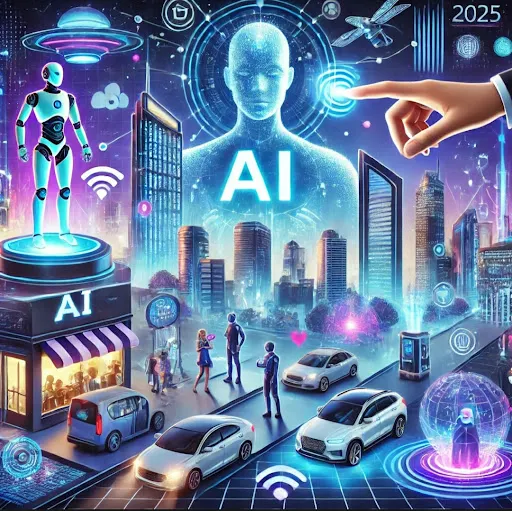Artificial Intelligence (AI) is not just a buzzword; it’s a revolutionary force shaping the world we live in. By 2025, AI will be deeply integrated into our daily lives, redefining how we work, interact, and solve problems. In this blog, we explore the transformative ways AI is set to impact every facet of our lives, from healthcare to education and beyond.
1. Personalised Healthcare
AI in healthcare will reach new heights in 2025. With advancements in predictive analytics and machine learning, doctors will rely on AI for accurate diagnoses, personalised treatment plans, and efficient patient monitoring. Wearable devices will continuously analyse health data, alerting individuals to potential issues before they become critical.
Example: AI tools can detect heart irregularities through smartwatches, potentially saving lives with early intervention.
2. Revolutionising Education
The education sector will see a major overhaul, thanks to AI. Personalised learning platforms will adapt to individual students' needs, offering tailored content based on their strengths and weaknesses. Virtual tutors powered by AI will provide 24/7 assistance, making learning accessible to everyone, regardless of location or financial resources.
Impact: Students in remote areas will access the same quality of education as those in urban centres.
3. Smarter Workplaces
By 2025, AI will be indispensable in the workplace. It will automate routine tasks, allowing employees to focus on strategic and creative responsibilities. Virtual assistants will manage schedules, analyse data, and even predict market trends, enhancing productivity.
Future Outlook: AI-powered tools could save companies billions by streamlining operations and reducing human error.
4. Enhanced Shopping Experiences
Retail will become more personalised, with AI analysing consumer preferences to recommend products and services. Virtual fitting rooms will use augmented reality and AI to let customers "try" clothes online. Inventory management will also improve, reducing waste and ensuring timely deliveries.
Example: Imagine an AI-powered chatbot suggesting the perfect gift for a loved one based on their interests.
5. AI-Driven Transportation
The future of transportation will be defined by AI. Autonomous vehicles will become safer and more efficient, reducing traffic accidents and congestion. Public transport systems will use AI to optimise routes and schedules, making travel faster and more convenient.
Fun Fact: By 2025, driverless cars could reduce traffic fatalities by up to 90%.
6. Smarter Homes
AI will turn homes into intelligent spaces. Smart home devices will learn habits, adjust lighting and temperature automatically, and even predict household needs like groceries. Security systems will become more sophisticated, using AI to detect and prevent threats.
Example: Your AI assistant could order essentials when it notices you’re running low.
7. Advanced Cybersecurity
With cyber threats becoming more complex, AI will play a crucial role in safeguarding data. AI algorithms will identify potential breaches in real time, stopping cyberattacks before they cause damage. It will also protect sensitive information, ensuring privacy in an increasingly digital world.
Impact: AI-driven security measures could save businesses millions in potential losses.
8. Creative Industries Redefined
AI is not just about numbers and automation; it’s also entering the creative world. From generating music and art to writing scripts and designing, AI will assist creators in producing high-quality content faster.
Debate: While some fear AI might replace human creativity, others believe it will serve as a collaborative tool to enhance artistic expression.
9. Environmental Solutions
AI will play a pivotal role in combating climate change by optimising energy usage, improving waste management, and predicting natural disasters. Smart agriculture powered by AI will enhance crop yields and reduce resource consumption.
Example: AI can analyse satellite data to monitor deforestation and suggest sustainable practices.
10. Accessible Financial Services
AI will make banking and financial services more inclusive. Chatbots and virtual assistants will simplify complex processes like loan applications and investment management. Fraud detection systems will also become more robust, ensuring safer transactions.
Outcome: Financial services will become faster, more accurate, and accessible to underserved populations.
Final Thoughts
By 2025, AI will touch nearly every aspect of our lives, making them more efficient, convenient, and secure. However, with these advancements come challenges like ethical concerns, job displacement, and data privacy. Striking the right balance between innovation and regulation will be critical as we embrace this AI-driven future.
FAQs
1. Will AI take over jobs by 2025?
AI will automate repetitive tasks but also create new job opportunities in fields like AI development, data analysis, and robotics.
2. Is AI safe to use in critical sectors like healthcare?
Yes, but ensuring transparency, ethical usage, and human oversight will be crucial for its reliability.
3. How will AI impact privacy?
AI’s reliance on data raises privacy concerns. Governments and companies must prioritise data security to mitigate risks.
4. Can small businesses afford AI technology?
Yes, many affordable AI solutions are emerging, making them accessible to small and medium-sized enterprises.
The future is here, and AI is leading the way. Are you ready to adapt to the AI revolution of 2025!
